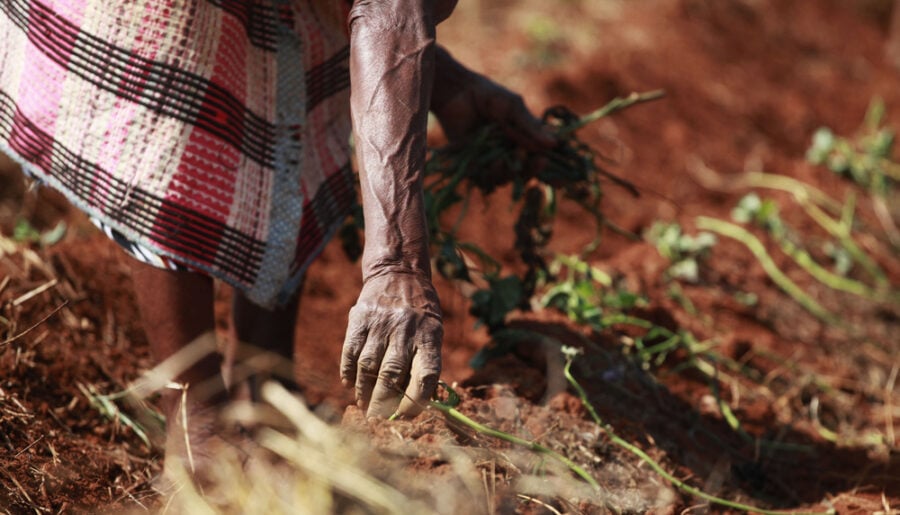A high-pitched and frightening warning was issued by United Nations Secretary-General Antonio Guterres about an “unprecedented global hunger crisis” exacerbated by the Russia-Ukrainian war following COVID-19 and climate turmoil, adding “a real danger of declaring multiple famines” this year.
According to the World Food Program and the FAO, the number of severely food insecure people worldwide has doubled to 276 million in the past two years.
WFP and FAO estimate that acute food insecurity will worsen in 20 countries, called hunger hotspots, between June and September.
The Global Food Security Index, a measure used by United Nations agencies, regional bodies and relief groups to determine the level of food insecurity, confirms that more than 460,000 people in Somalia, Yemen and South Sudan have experienced famine conditions, and this is the stage before declaring a famine in a region.
“There is a real danger of declaring multiple famines in 2022,” and “millions of people in 34 countries are on the brink of famine,” Guterres warns in a speech at a conference in Berlin that discussed this issue. The Secretary-General warned that “2023 may be the worst.”
Russian-Ukrainian war
Guterres considers that the Russian-Ukrainian war has “aggravated a three-dimensional crisis – a food crisis, an energy crisis and an economic crisis.”
This war, which has entered its fifth month, including the blockade of the Black Sea ports, has prevented the exit of grain, and consequently, increased food prices. All indications point to more difficult challenges ahead.
The continuation of war in these two countries, which account for a quarter of the world’s exports of wheat, a fifth of its barley and corn, and more than half of its sunflower seed oil exports, means that global supplies of cereals will remain threatened, which in turn leads to food insecurity among the world’s most vulnerable populations.
Hence the leaders of the G7 countries, who pledged today to allocate $5 billion to improve global food security, called on Russia in a statement Monday to allow the exit of grain shipments from Ukraine in order to avoid the aggravation of the global food crisis. “We urgently call on Russia to cease its attacks on agricultural and transport facilities unconditionally and to allow the passage of grain shipments from Ukraine’s Black Sea ports,” their statement said.
The European Union also accuses Russia of using food as a weapon in its war in Ukraine, and of “blocking ports, attacking agricultural infrastructure, and turning wheat fields into war zones.” The union blames the Kremlin for the global food crisis, “which is causing suffering to the poorest countries and low-income families.”

Three crises
The International Monetary Fund says in a recently published research note that three combined crises – conflict, COVID, and climate change – lead to another crisis: hunger.
In addition to disrupting food production and shipments, mainly from Ukraine, the war is also affecting global food output through its impact on fertilizers, the cost of which has already risen as a result of higher energy prices. Russia and Ukraine produce large quantities of potash-based crop nutrients, and the war has raised their costs sharply.
Climate change
Even before the outbreak of the Russo-Ukrainian war, climate change posed a serious challenge to global food security.
The phenomenon of climate change hit various regions of the world and affected agricultural production. Some of them suffered from difficult weather conditions, such as storms, floods, and droughts, while others suffered from high temperatures. This is what is happening now, and it is expected to increase in the future.
This prompts the need to find different types of seeds and crops and new strategies to ensure the resilience of those crops to coexist in a “hotter” environment with climate change, according to what was announced by the US Assistant Secretary of State for the Office of Economic and Trade Affairs, Ramin Taloy.
Food commodity prices
At one time, the prices of food commodities reached record levels. However, there are expectations that it may decline, with signs of optimism emerging thanks to the many countries producing basic crops to increase their agricultural production, which helps to make up for the shortfall caused by the war.
This will, of course, help lower price inflation in the world, if these aims are achieved.
Expectations indicate that Australia, one of the world’s largest wheat exporters, will produce large quantities of the strategic crop this year, while Brazil is heading to produce larger quantities of corn.
Concerns over the possibility of a decrease in the area planted with wheat and soybeans in the spring season in North America also eased.
Arab region
It is not surprising that the Arab region is greatly impacted by the consequences of the Russian-Ukrainian war. It imports about 42 percent of its wheat and 23 percent of its vegetable oil needs from Ukraine and Russia, according to the World Food Program.
According to the media spokeswoman for the World Food Program in the Middle East, Dr. Abeer Atifa, wheat flour prices rose in the month following the outbreak of the war by 47 percent in Lebanon, 15 percent in Libya, 14 percent in Palestine, 11 percent in Yemen, and about 10 percent in Syria.
The prices of wheat flour in Egypt, where bread has historically been of great importance to its citizens, increased by 15 percent in March.








